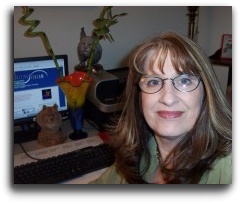London, England (PRWeb) January 6, 2007 --
Tens of thousands of volunteers from around the world are being recruited to participate in a series of web-based experiments, making it the largest mind-over-matter study in history.
The experiments are the brain-child of science writer Lynne McTaggart, whose new book The Intention Experiment forms the catalyst for the trials. The book is published in the New Year in the US, (Simon & Schuster) the UK (Harper Collins) and The Netherlands (Ankh-Hermes).
Working with her are leading physicists and psychologists from the University of Arizona, Princeton University, the International Institute of Biophysics and the Institute of Noetic Sciences.
The first large-scale studies are being prepared by Dr. Gary Schwartz, psychologist and director of America's National Institutes of Medicine-funded Center for Frontier Medicine in Biofield Science at the University of Arizona.
Besides Schwartz, other scientists working in the consortium include: German physicist Dr. Fritz-Albert Popp of the International Institute of Biophysics in Neuss, Germany; Dr. Robert Jahn and Brenda Dunne of the International Consciousness Research Laboratory, formerly of Princeton University; and Drs Marilyn Schlitz and Dean Radin of the Institute of Noetic Sciences in California.
Through the Intention Experiment website (www.theintentionexperiment.com), readers of McTaggart's new book are invited to participate in an unprecedented experiment: to test the power of their thoughts.
The study will conduct periodic large-scale experiments to determine whether the focused intention of its readers has an effect on scientifically quantifiable targets in various laboratories around the globe -- a specific living thing or a population where change caused by group intention can be measured.
Website specialists working with the scientists through the website will coordinate reader involvement and track results.
A pilot experiment, testing the idea and detailed in the book, was successful. McTaggart asked a group of 16 meditators based in London to direct their thoughts to four remote targets in Dr. Popp's laboratory in Germany: two types of algae, a plant and a human volunteer. The meditators were asked to attempt to lower certain measurable biodynamic processes.
Popp and his team discovered significant changes in all four targets while the intentions were being sent, compared to times the meditators were 'resting.'
Schwartz and McTaggart are preparing the target for the first intention experiment target, an enclosed 'mini-Gaia' with an artificially raised temperature. The plan is to ask the readers to attempt to lower it at a particular moment through focused 'intention.'
"If we're successful the implications would be amazing," says Schwartz. "It would suggest that our collective human consciousness can actually do something about global warming."
In the course of her research into her earlier book, The Field, McTaggart uncovered literally hundreds of scientific studies carried out by reputable frontier scientists, which suggested that consciousness, under certain circumstances, has the capacity to change physical matter.
These studies, all published in peer-reviewed scientific journals, showed evidence that directing thoughts at a target is capable of altering machines, cells and, indeed, entire multicelled organisms like human beings.
The ongoing experiments will solely focus on philanthropic targets. Other possibilities being discussed by the scientific consortium include using a child with Attention Deficit Disorder or an adult with Alzheimer's disease.
One eventual target could be determining whether focused group intention will enable wounds to heal more quickly than usual. It is known and accepted that wounds generally heal at a particular, quantifiable rate with a precise pattern. Any departure from the norm can be precisely measured and shown to be an experimental effect.
The global Intention Experiment laboratory is to be entirely self-funded. The website and all the experiments will be funded by the proceeds of the book or grants, now and in the future.
McTaggart stresses that she cannot guarantee that the big experiments will work -- at first or ever. "As scientists and objective researchers, we will be duty-bound to faithfully report the data we have. But what's most important is just being willing to ask the questions," says McTaggart. "That's what real science is, and that's what we're doing with the Intention Experiments. Just being unafraid to ask what seems like a outrageous question."
The Intention Experiment, published by Free Press, Simon & Schuster in the US (HarperCollins in the UK), is the first book firmly grounded in science that explains how human thoughts and intentions are an actual physical something.
The Intention Experiment builds on the discoveries of McTaggart's first book, international bestseller The Field: The Quest for the Secret Force of the Universe, The Field, which documented discoveries that point to the existence of a quantum energy field holding everything -- including each one of us -- in its invisible web.
The Field was lauded around the world, by notables such Sir Arthur C. Clarke and Dr. Wayne Dyer, as the first book to synthesize all the discoveries from frontier quantum physicists about the nature of consciousness into a unified theory, comprehensive to the ordinary layman. Dyer called it "the most profound and enlightening book I have ever read."
For more information please contact:Pavel MikoloskiLiving the FieldLondonDDI:+44 (0)208 971 1660Main:+44 (0)208 944 9555Fax: +44 (0)870 444 9887


